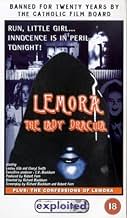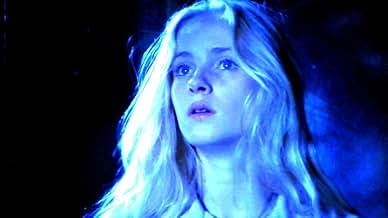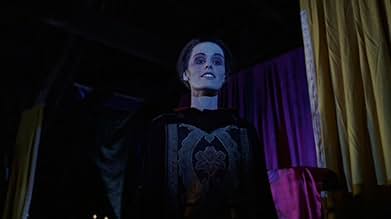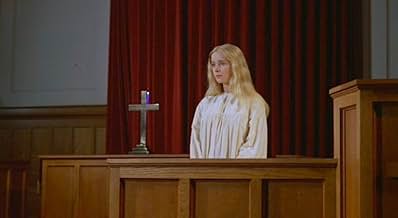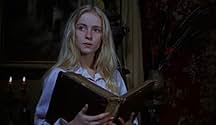IMDb RATING
6.1/10
2.7K
YOUR RATING
A young girl who returns to her hometown to see her dying father finds herself being drawn into a web of vampirism and witchcraft.A young girl who returns to her hometown to see her dying father finds herself being drawn into a web of vampirism and witchcraft.A young girl who returns to her hometown to see her dying father finds herself being drawn into a web of vampirism and witchcraft.
- Director
- Writers
- Stars
- Director
- Writers
- All cast & crew
- Production, box office & more at IMDbPro
Featured reviews
Scary repeated showings on Thing Theater in Chicago during the 70's did their damage to me. Vampirism, lesbianism, witchcraft all done in that plodding, atmospheric 70's way. Eerie.
Never had heard of this one before, and I assumed it would just be a low-budget snoozer - but it's not! It's pretty damn good! Angelic girl leaves her church to find her murderous dad so she can forgive him and finds herself involved with vampires instead. Very well shot and quite creepy. This deserves more attention. Plenty of tension; it feels like there's something supernatural and terrifying around every corner. Cheryl Smith made her debut here - she would later adopt the professional nickname Rainbeaux and briefly play with the Runaways band.
10norfaust
I first read about this obscure 70s vampire flick a couple of years back, in one of my numerous reference books on hard-to-find films. Having never heard of director Richard Blackburn at the time and being a fan of the more exotic and offbeat in cinema (not to mention that I was extremely keen on seeing the film), I decided to try to locate it on VHS. Unfortunately this would turn out to be an almost impossible task (as with most films of this kind), and I soon grew disillusioned and frustrated, recognizing the sad fact that I would probably never even get to see the film. Luckily this would soon change: A few weeks back I was lucky enough to come across a rare Greek pre-record/ex rental tape of the film, and, not hesitating for a moment, I bought it. Needless to say, this was a decision I have NEVER regretted since!!
The reasons for this are simple: "Lemora" (aka: Lemora-Lady vampire, The legendary curse of Lemora) is doubtless one of the best horror films I´ve seen in years, a classic that deserves to be right up there with "Night of the living dead", "The exorcist" and "Evil dead". First time director Richard Blackburn creates a chilling and highly original supernatural tale of religious anxiety, repressed sexuality and initiation, a debut film that leaves a lasting impression on both the hearts and minds of anyone lucky enough to see it.
Plotwise, the film follows a young Christian girl (Lila Lee, portrayed by Cheryl Smith), the daughter of a wanted gangster, who leaves her home town to visit her father on the death bed. As it turns out this is all a set up, and Lila soon finds herself under the spell of a female vampire called Lemora. She is the leader of some sort of religious cult in a small village deep into the woods and she plans to initiate the young girl in the cult´s activities. The young girl, sensing that something is wrong, flees from Lemora´s grasp and tries to find a way out of the labyrinthine woods. But will she make it?
Overall this is a beautiful, poetic and hauntingly surreal adult fairy tale, the horror film equivalent of "Little Red Riding Hood" (though with some modifications). Although shot on a very low budget, the film manages to overcome all its budgetary constraints and deliver a final product with more (emotional) impact than a dozen modern horror films combined. The film is genuinely creepy and atmospheric, with an almost Gothic flavour reminiscent of Hammer and Benjamin Clark & Alan Ormsby´s "Children shouldn´t play with dead things". The performances are all excellent, and the make-up & gore effects are surprisingly good, adding to the creepiness of the story. Add to all this a charismatic lead (Lemora, convincingly played by Lesley Gilb) and you have all the characteristics of a cult classic; A unique, mesmerizing film experience full of "primitive" energy, a film where you find yourself drawn into a mysterious world, yet where you can´t really describe why the film appeals to you.
What most viewers have either failed to recognize or not bothered to comment on though, is the fact that there is so much more to this film than meets the eye. Underneath the surface this intelligent & well written little low budget gem is a complex allegory (or parable if you will) concerned with questions of faith, the process of growing up and the duality of man. The whole film is one long symbolic journey, an odyssey, into the darkness of man´s heart; A journey from childhood to adolescence (leaving the childhood illusions and facing the real world), from oppression and self-deception to freedom and self-recognition. The main character leaves her safe, protected & idyllic sanctuary (church/local community), and stumbles into a frightening and nightmarish world of violence, darkness, death and lust. One the way she encounters numerous dangers and temptations (she succumbs to many of them), and she gradually changes from a young, innocent beauty with little knowledge of the world, to a mature woman who has both seen and felt death. Throughout the journey her believes are questioned, and one by one her pietistic fears are taken form her, as she finally recognizes her true nature (from which there is no escape). The characters, as well as the setting, all have a symbolic function and significance; The young, pristine girl (symbolically dressed in white; Innocence), the vile, savage, beast-like creatures out in the woods (man´s uncontrollable primal urges, sexuality, the beast in man), and Lemora (forbidden knowledge, freedom, breaking free of chains, immortality). Yes, Lemora probably symbolizes everything we do not want to face, the darkness deep inside of us.
As for themes, the film is concerned with religious hypocrisy, the breaking of taboos (sexual and others), good vs. evil, light vs. darkness, sin, and most importantly of all, recognizing the darkness within ourselves (an aspect of man that Christianity refuses to accept and for centuries has tried to suppress). The film does not draw any conclusions though, and the ending, which is both ambivalent and a bit confusing, leaves one to ponder. Did it all just happen in the young girl´s mind, and is this a film that criticizes religion as narrow-minded and suppressive or that embraces it? Personally I feel it´s the former, but some of you may disagree.
Anyway, this film comes highly recommended!! Any serious horror fan should seek out this classic at once (you´ll probably have a hard time locating it though!) And if you ask me: It´s definitely about time that this horror masterpiece gets a DVD release (Anchor Bay, please read this!!).
The reasons for this are simple: "Lemora" (aka: Lemora-Lady vampire, The legendary curse of Lemora) is doubtless one of the best horror films I´ve seen in years, a classic that deserves to be right up there with "Night of the living dead", "The exorcist" and "Evil dead". First time director Richard Blackburn creates a chilling and highly original supernatural tale of religious anxiety, repressed sexuality and initiation, a debut film that leaves a lasting impression on both the hearts and minds of anyone lucky enough to see it.
Plotwise, the film follows a young Christian girl (Lila Lee, portrayed by Cheryl Smith), the daughter of a wanted gangster, who leaves her home town to visit her father on the death bed. As it turns out this is all a set up, and Lila soon finds herself under the spell of a female vampire called Lemora. She is the leader of some sort of religious cult in a small village deep into the woods and she plans to initiate the young girl in the cult´s activities. The young girl, sensing that something is wrong, flees from Lemora´s grasp and tries to find a way out of the labyrinthine woods. But will she make it?
Overall this is a beautiful, poetic and hauntingly surreal adult fairy tale, the horror film equivalent of "Little Red Riding Hood" (though with some modifications). Although shot on a very low budget, the film manages to overcome all its budgetary constraints and deliver a final product with more (emotional) impact than a dozen modern horror films combined. The film is genuinely creepy and atmospheric, with an almost Gothic flavour reminiscent of Hammer and Benjamin Clark & Alan Ormsby´s "Children shouldn´t play with dead things". The performances are all excellent, and the make-up & gore effects are surprisingly good, adding to the creepiness of the story. Add to all this a charismatic lead (Lemora, convincingly played by Lesley Gilb) and you have all the characteristics of a cult classic; A unique, mesmerizing film experience full of "primitive" energy, a film where you find yourself drawn into a mysterious world, yet where you can´t really describe why the film appeals to you.
What most viewers have either failed to recognize or not bothered to comment on though, is the fact that there is so much more to this film than meets the eye. Underneath the surface this intelligent & well written little low budget gem is a complex allegory (or parable if you will) concerned with questions of faith, the process of growing up and the duality of man. The whole film is one long symbolic journey, an odyssey, into the darkness of man´s heart; A journey from childhood to adolescence (leaving the childhood illusions and facing the real world), from oppression and self-deception to freedom and self-recognition. The main character leaves her safe, protected & idyllic sanctuary (church/local community), and stumbles into a frightening and nightmarish world of violence, darkness, death and lust. One the way she encounters numerous dangers and temptations (she succumbs to many of them), and she gradually changes from a young, innocent beauty with little knowledge of the world, to a mature woman who has both seen and felt death. Throughout the journey her believes are questioned, and one by one her pietistic fears are taken form her, as she finally recognizes her true nature (from which there is no escape). The characters, as well as the setting, all have a symbolic function and significance; The young, pristine girl (symbolically dressed in white; Innocence), the vile, savage, beast-like creatures out in the woods (man´s uncontrollable primal urges, sexuality, the beast in man), and Lemora (forbidden knowledge, freedom, breaking free of chains, immortality). Yes, Lemora probably symbolizes everything we do not want to face, the darkness deep inside of us.
As for themes, the film is concerned with religious hypocrisy, the breaking of taboos (sexual and others), good vs. evil, light vs. darkness, sin, and most importantly of all, recognizing the darkness within ourselves (an aspect of man that Christianity refuses to accept and for centuries has tried to suppress). The film does not draw any conclusions though, and the ending, which is both ambivalent and a bit confusing, leaves one to ponder. Did it all just happen in the young girl´s mind, and is this a film that criticizes religion as narrow-minded and suppressive or that embraces it? Personally I feel it´s the former, but some of you may disagree.
Anyway, this film comes highly recommended!! Any serious horror fan should seek out this classic at once (you´ll probably have a hard time locating it though!) And if you ask me: It´s definitely about time that this horror masterpiece gets a DVD release (Anchor Bay, please read this!!).
6sol-
A dark, atmospheric little film, it is quite bizarre and intriguing to watch, with shadow enhancing lighting, flashy colours, great sets, and a fine lead performance by Cheryl Smith, who is a perfect choice to play an innocent uncorrupted. On the other hand, the writer-director gives off a somewhat restrained performance as a priest, and towards the end, the film heads off into rather messy territory, with excesses of horror and too many slow motion, plus it takes forever to wrap the story up. There are some interesting ideas at hand, and a few worthwhile production elements, but overall this is a film that is much more so interesting than it is great.
It isn't hard to see why 'Lemora' was condemned by the Catholic film society. It's the story of a pubescent girl's fall from innocence and her sexual awakening, told in a 'fairytale for adults' manner. There are some amoral scenes to sit through with hints of lesbianism between the child and her vampire tutor that occasionally come across as sleazy, especially when the pubescent girl is given a bath by Lemora ('What an exciting figure you have').
Ambitiously set in the 1920s, a gangster brutally murders his wife and her lover before disappearing into the country. His thirteen-year-old daughter, Lila Lee (played by Cheryl Smith*) is cared for by the Reverend Mueller (director, Blackburn), who secretly houses sensuous feeling for his little choirgirl. Lila is delighted when she receives a letter from the mysterious Lemora, detailing her father's deteriorating condition. Lemora demands that Lila be present at her father's bed immediately. Lila's journey to Lemora's hidden cottage, through dense dark woods is constantly plagued; firstly, by lecherous older men, then a psychopathic bus-driver and then a group of fanged beasts who chase her from the bus. The seductive Lemora's house is filled with children, all of whom are part of her growing legion of vampires. The Reverend has decided to admit his sordid desires to Lila and begins to search for her. You'd think that was enough plot development, but after this point more twists follow, which might confuse some viewers.
'Lemora', a late night TV favourite, is considered to be one of the classic vampire films of the early seventies, opposite 'Count Yorga, Vampire' (Bob Kelljan, 1970). There strong sexual overtones and the corruption of innocence storyline were the prime reasons why the Catholic Film Board wanted this film banned for almost twenty years. Due to its lack of budget, (poor sound and sketchy cinematography) and European feel, the film often looks like a porn film which doesn't help matters concerning the sexual connotations, but they're never really presented in a exploitative manner.
Ambitiously set in the 1920s, a gangster brutally murders his wife and her lover before disappearing into the country. His thirteen-year-old daughter, Lila Lee (played by Cheryl Smith*) is cared for by the Reverend Mueller (director, Blackburn), who secretly houses sensuous feeling for his little choirgirl. Lila is delighted when she receives a letter from the mysterious Lemora, detailing her father's deteriorating condition. Lemora demands that Lila be present at her father's bed immediately. Lila's journey to Lemora's hidden cottage, through dense dark woods is constantly plagued; firstly, by lecherous older men, then a psychopathic bus-driver and then a group of fanged beasts who chase her from the bus. The seductive Lemora's house is filled with children, all of whom are part of her growing legion of vampires. The Reverend has decided to admit his sordid desires to Lila and begins to search for her. You'd think that was enough plot development, but after this point more twists follow, which might confuse some viewers.
'Lemora', a late night TV favourite, is considered to be one of the classic vampire films of the early seventies, opposite 'Count Yorga, Vampire' (Bob Kelljan, 1970). There strong sexual overtones and the corruption of innocence storyline were the prime reasons why the Catholic Film Board wanted this film banned for almost twenty years. Due to its lack of budget, (poor sound and sketchy cinematography) and European feel, the film often looks like a porn film which doesn't help matters concerning the sexual connotations, but they're never really presented in a exploitative manner.
Did you know
- TriviaNotably similar to the story Carmilla by Sheridan Le Fanu in which a female seduces a teenage girl. Towards the end of the film Lemora indicates that she has had many names.
- GoofsWhen Lila is first taken into the house by Lemora, she is told to go upstairs to her room. Lemora says "It is the first open door at the end of the hall." But when Lila goes upstairs ALL of the doors are closed.
- ConnectionsFeatured in Movie Macabre: Lemora A Child's Tale of the Supernatural (1983)
- SoundtracksPaper Angel
Sung by The Black Whole
- How long is Lemora: A Child's Tale of the Supernatural?Powered by Alexa
Details
- Release date
- Country of origin
- Language
- Also known as
- Lemora: A Child's Tale of the Supernatural
- Filming locations
- Phillips Mansion - 2640 W. Pomona Boulevard, Pomona, California, USA(Lemora's house exteriors)
- Production company
- See more company credits at IMDbPro
Contribute to this page
Suggest an edit or add missing content


